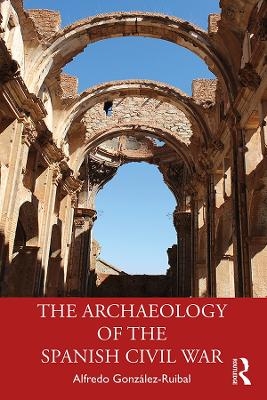
The Archaeology of the Spanish Civil War
Routledge (Verlag)
978-0-367-20200-2 (ISBN)
Between 1936 and 1939, totalitarianism and democracy, fascism and revolution clashed in Spain, while the latest military technologies were being tested, including strategic bombing and combined arms warfare, and violence against civilians became widespread. Archaeology, however, complicates the picture as it brings forgotten actors into play: obsolete weapons, vernacular architecture, ancient structures (from Iron Age hillforts to sheepfolds), peasant traditions, and makeshift arms. By looking at these things, another story of the war unfolds, one that pays more attention to intimate experiences and anonymous individuals. Archaeology also helps to clarify battles, which were often chaotic and only partially documented, and to understand better the patterns of political violence, whose effects were literally buried for over 70 years. The narrative starts with the coup against the Second Spanish Republic on 18 July 1936, follows the massacres and battles that marked the path of the war, and ends in the early 1950s, when the last forced labor camps were closed and the anti-Francoist guerrillas suppressed.
The book draws on 20 years of research to bring together perspectives from battlefield archaeology, archaeologies of internment, and forensics. It will be of interest to anybody interested in historical and contemporary archaeology, human rights violations, modern military history, and negative heritage.
Alfredo González-Ruibal is a researcher with the Institute of Heritage Sciences of the Spanish National Research Council. His work focuses on the archaeology of the contemporary past and African archaeology. Among other books, he has edited Ethics and the Archaeology of Violence (2015, with Gabriel Moshenska) and is the author of An Archaeology of the Contemporary Era (2018), the latter also with Routledge. He is the managing editor of the Journal of Contemporary Archaeology.
Preface; Chapter 1. Introduction; Chapter 2. Time to kill (July 1936 – February 1937); Chapter 3. Capital of Glory (October-December 1936); Chapter 4. Capital of Misery (July 1936-October 1938); Chapter 5. The path to total war (February-October 1937); Chapter 6. Wait and retreat (November 1937 – March 1938); Chapter 7. Forgotten battles (April-July 1938); Chapter 8. The Battle of the Ebro (July-November 1938); Chapter 9. Dead men walking (November 1938-March 1939); Chapter 10. The never-ending war (April 1939-1952); Chapter 11. Aftermath. Heritage and memory; Conclusions
| Erscheinungsdatum | 12.03.2020 |
|---|---|
| Zusatzinfo | 111 Halftones, black and white; 111 Illustrations, black and white |
| Verlagsort | London |
| Sprache | englisch |
| Maße | 156 x 234 mm |
| Gewicht | 600 g |
| Themenwelt | Geisteswissenschaften ► Archäologie |
| Geschichte ► Allgemeine Geschichte ► Neuzeit (bis 1918) | |
| Geisteswissenschaften ► Geschichte ► Regional- / Ländergeschichte | |
| Geschichte ► Teilgebiete der Geschichte ► Militärgeschichte | |
| ISBN-10 | 0-367-20200-X / 036720200X |
| ISBN-13 | 978-0-367-20200-2 / 9780367202002 |
| Zustand | Neuware |
| Haben Sie eine Frage zum Produkt? |
aus dem Bereich


